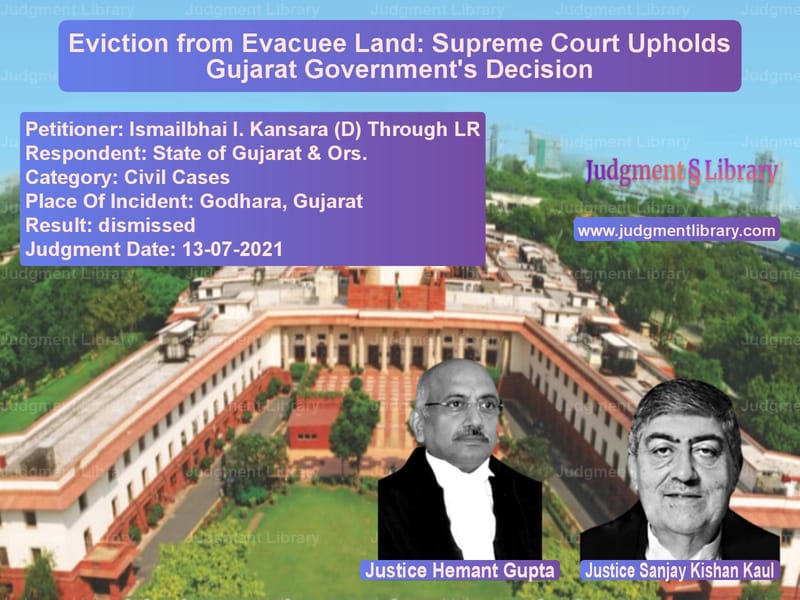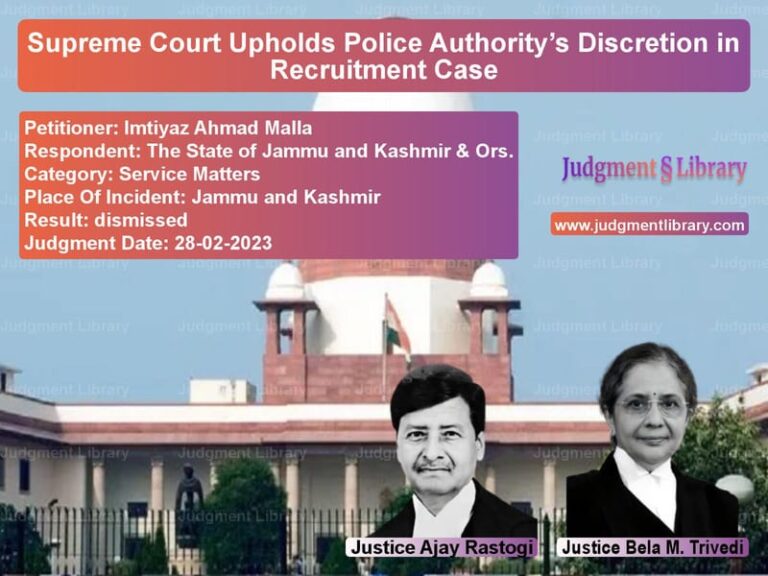Eviction from Evacuee Land: Supreme Court Upholds Gujarat Government’s Decision
The case of Ismailbhai I. Kansara (D) Through LR v. State of Gujarat & Ors. is a significant legal dispute concerning land rights, government policies on evacuee property, and the rights of encroachers. The Supreme Court, in its ruling, upheld the eviction order against the appellant, reinforcing the principle that unauthorized occupation of evacuee land cannot be regularized against statutory provisions. The ruling has substantial implications for property laws, particularly for cases involving disputed land occupation.
Background of the Case
The dispute originates from the appellant’s occupation of land measuring 0-14 acre-guntha in Survey No. 191/2 at Godhara, Gujarat. The appellant, Ismailbhai I. Kansara, had been running a garage named Bharat Motor Garage on the said land since 1977. However, the land was classified as evacuee property under the Displaced Persons (Compensation and Rehabilitation) Act, 1954.
On June 23, 1992, the appellant was served an eviction notice under Section 19(2)(b) of the Displaced Persons Act. This notice stated that the appellant’s occupation of the land was unauthorized, and he was required to vacate the premises. In response, the appellant challenged the eviction order by filing a Special Civil Application (SCA) before the Gujarat High Court in 1992.
Legal Issues Before the Court
- Did the appellant have a legal right to remain on the evacuee land?
- Could the government’s policies on regularization of encroachments be applied to the appellant’s case?
- Was the eviction notice issued in 1992 legally valid?
- Did the appellant receive a fair opportunity to present his case?
The Gujarat High Court dismissed the appellant’s writ petition, holding that the land was evacuee property, and he had no right to claim ownership or seek regularization.
Petitioner’s Arguments
The appellant contended that he had been in possession of the land for several decades and was entitled to regularization under two government policies:
- The 1978 government policy for allotment of evacuee land to encroachers.
- The 1980 resolution for the allotment of public land to unauthorized occupants.
The appellant’s counsel argued that the eviction order was issued without providing him with an adequate opportunity to present his case. He further contended that he had applied to purchase the land, but his application was not considered due to the pending legal proceedings.
Respondent’s Arguments
The State of Gujarat, representing the respondents, argued:
- The land in question was designated for displaced persons, and an encroacher could not be granted ownership rights.
- The policies on regularization did not apply to evacuee land, which was governed by a special statute—the Displaced Persons Act, 1954.
- The appellant’s occupation was unauthorized and his eviction was lawful under Section 19 of the Act.
Supreme Court’s Observations
Justice Hemant Gupta, delivering the judgment, observed:
“The appellant’s claim for regularization has no legal basis as evacuee land is meant for displaced persons, not encroachers. The policy decisions of 1978 and 1980 do not override statutory provisions of the Displaced Persons Act.”
The Court noted that the government had the authority to regulate and dispose of evacuee land, prioritizing displaced persons over encroachers. The eviction order was found to be legally enforceable.
The Court also analyzed the history of the land in question and held that it was originally allotted to a displaced person under government schemes. It was later encroached upon by the appellant, who had no legal claim over it. The Supreme Court ruled that the policies cited by the appellant were not applicable to evacuee land, as such land was to be disposed of strictly under Section 20 of the Displaced Persons Act.
Judicial Precedents and Relevant Laws
The Supreme Court relied on past judgments that clarified the distinction between regularization policies and statutory provisions governing evacuee land. The Court cited:
- Ramesh Parsram Malani v. State of Telangana, which held that evacuee land could only be allotted to displaced persons, not encroachers.
- State of Gujarat v. Patel Raghav Natha, which reaffirmed that encroachment does not confer property rights.
The judgment underscored the principle that government land earmarked for displaced persons cannot be converted into private property through encroachment, as it would defeat the purpose of rehabilitation policies.
Key Takeaways from the Judgment
- Encroachers do not acquire legal rights over government or evacuee land.
- Statutory provisions governing land allocation take precedence over government resolutions.
- Evacuee land must be used for rehabilitating displaced persons, not for regularizing unauthorized occupation.
- The eviction notice served to the appellant was valid and legally enforceable.
- Courts must uphold legal frameworks that protect the rights of displaced persons.
Conclusion
The Supreme Court’s decision reinforces the principle that encroachment does not confer ownership rights. The ruling provides much-needed legal clarity on evacuee property rights and the limited scope of regularization policies. It serves as a precedent for future cases where encroachers seek to claim rights over government land.
By dismissing the appeal, the Court has reaffirmed the government’s authority to regulate and dispose of evacuee land strictly under statutory provisions. This judgment upholds the rule of law and ensures that land meant for displaced persons is not illegally occupied.
Petitioner Name: Ismailbhai I. Kansara (D) Through LR.Respondent Name: State of Gujarat & Ors..Judgment By: Justice Hemant Gupta, Justice Sanjay Kishan Kaul.Place Of Incident: Godhara, Gujarat.Judgment Date: 13-07-2021.
Don’t miss out on the full details! Download the complete judgment in PDF format below and gain valuable insights instantly!
Download Judgment: ismailbhai-i.-kansar-vs-state-of-gujarat-&-o-supreme-court-of-india-judgment-dated-13-07-2021.pdf
Directly Download Judgment: Directly download this Judgment
See all petitions in Property Disputes
See all petitions in Landlord-Tenant Disputes
See all petitions in Specific Performance
See all petitions in Judgment by Hemant Gupta
See all petitions in Judgment by Sanjay Kishan Kaul
See all petitions in dismissed
See all petitions in supreme court of India judgments July 2021
See all petitions in 2021 judgments
See all posts in Civil Cases Category
See all allowed petitions in Civil Cases Category
See all Dismissed petitions in Civil Cases Category
See all partially allowed petitions in Civil Cases Category







